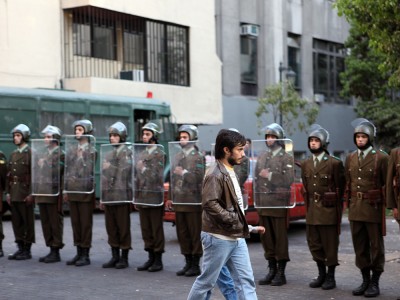
Pablo Larrain’s Oscar-nominated No is pretty high on the list of films you should see — but which many of you will avoid simply because it has subtitles. A few more of you may drop out when you learn that the movie was shot on Betacam (the prevalent TV news format of the film’s time period, 1988) and is hard-matted into the pillar-boxed format to retain its TV shape on the big screen. Actually, that choice was brilliant in that it allows the film to both capture the look of the era and to seamlessly cut back and forth between new footage and period news footage — giving the movie a sense of urgency. The surprise in all this is that the story was sufficiently compelling and entertaining after the first 20 minutes to make me completely forget both the quality of the image and that I was reading subtitles. I was absorbed in the drama to a degree that I neither cared nor noticed — and this was true through two viewings of the picture. The second did serve to give me a chance to relish the amusing ironies inherent in the story — and how a movie about the voter overthrow of General Pinochet in Chile in 1988 relates to our own political process.

It turns out that this is the third film that Larrain has made about the Pinochet era — and presumably it’s the final one. The other two — Tony Manero (2008) and Post Mortem (2008) — had pretty limited releases and never penetrated our local theaters. From what I can tell, No is also the most optimistic and lightest of the three — probably because it ends with Pinochet’s fall from power. It then has the freedom to be a little more playful in the way it handles the story. It’s not without its share of pointed commentary, but the tone is largely cheerful — and it should be noted that the good guys (the anti-Pinochet contingent) often come in for a bit of satire themselves.

The film stars Gael Garcia Bernal (without whom I doubt it would work) as a director of TV commercials named René Saavedra — who is the son of a wealthy leftist and who was sent into exile. Recently returned to Chile, René has established himself with an advertising agency and made a name for himself when he’s approached to head up the “No” campaign — a straight yes or no referendum whether or not Pinochet (forced into this by international pressure) should remain president. René doesn’t really want to be involved — having little in the way of political interest — but he finds himself drawn into it, which puts him not only at odds with the Pinochet regime, but with his own employer, Lucho Guzmán (Alfredo Castro). In fact, though he and Guzmán remain business colleagues, they each end up working for the respective campaigns. It makes for terrific drama — and drama is what it is, because René Saavedra is a character invented (rather differently) by Antonio Skarmeta in The Plebiscite, the play on which the film is loosely based. Larrain has used the character to establish a larger point — and to make the material tractable. (An earlier, less reductive cut apparently ran four-and-a-half hours.)

When all is said and done, the film is about the power of packaging and advertising to carry an election. Rene’s idea is that the “No” campaign can be sold like any other product — as long as it’s “in the social context” (his preamble to every presentation for any product). He packages hope and happiness while the “Yes” campaign tries to work on selling fear — and the idea that the Pinochet regime offers “a system in which anyone can be rich. Careful — not everyone. Anyone. You can’t lose when everyone is betting on being that anyone.” (It’s kind of Randian.) When that doesn’t work so well, Guzmán tries to counter with campaigns co-opting René‘s techniques, which partly fails because all the artists — except those at the bottom of the barrel — are with the leftist “No” campaign. It all works. It works as satire (of just about everyone it touches). It works as drama. And strangely, considering we know the outcome, it generates considerable suspense. Really, you should catch this one. Rated R for language.
Starts Friday at Carolina Cinemas



It turns out that this is the third film that Larrain has made about the Pinochet era
If it’s as good as Yes and Maybe, I’m there!
You need to ease up on the caffeine.
This one crashed and burned here. Too bad. It appears to be gone by Thursday.